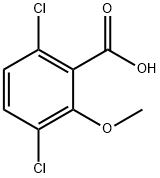Dicamba , Analysis standard product, 99% , 1918-00-9
Synonym(s):
3,6-Dichloro-o-anisic acid;3,6-Dichloro-2-methoxybenzoic acid
CAS NO.:1918-00-9
Empirical Formula: C8H6Cl2O3
Molecular Weight: 221.04
MDL number: MFCD00055283
EINECS: 217-635-6
| Pack Size | Price | Stock | Quantity |
| 250MG | RMB358.40 | In Stock |
|
| others | Enquire |
PRODUCT Properties
| Melting point: | 112-116 °C (lit.) |
| Boiling point: | 316.96°C (rough estimate) |
| Density | 1.57 |
| refractive index | 1.5000 (estimate) |
| Flash point: | 2 °C |
| storage temp. | 2-8°C |
| solubility | Chloroform (Slightly), Methanol (Slightly) |
| pka | 2.40±0.25(Predicted) |
| form | Crystals |
| color | White |
| Water Solubility | 50 g/100 mL |
| λmax | 223nm(lit.) |
| Merck | 14,3040 |
| BRN | 2453039 |
| LogP | 2.210 |
| CAS DataBase Reference | 1918-00-9(CAS DataBase Reference) |
| NIST Chemistry Reference | Benzoic acid, 3,6-dichloro-2-methoxy-(1918-00-9) |
| EPA Substance Registry System | Dicamba (1918-00-9) |
Description and Uses
Dicamba was introduced in the 1960s and is selective in cereals, corn (Zea mays), sugar cane (Saccharum spp.), asparagus (Asparagus officinalis), and turf for the pre- and post-emergence control of annual and perennial broadleaf weeds. Dicamba exhibits lowto- moderate persistence in most soils. See Table 10 for the nomenclature, chemical structure, and physical and chemical properties of dicamba.
Dicamba is mainly used as an herbicide to control weeds, dock, bracken, and brush. Dicamba is frequently applied with other herbicides, including atrazine, glyphosate, imazethapyr, ioxynil, and mecoprop.
Safety
| Symbol(GHS) |   GHS05,GHS07 |
| Signal word | Danger |
| Hazard statements | H302-H318-H412 |
| Precautionary statements | P264-P270-P273-P280-P301+P312-P305+P351+P338 |
| Hazard Codes | Xn,N,F |
| Risk Statements | 22-41-52/53-36-20/21/22-11 |
| Safety Statements | 26-61-36-16 |
| RIDADR | UN 3077 9/PG 3 |
| WGK Germany | 2 |
| RTECS | DG7525000 |
| HS Code | 29189900 |
| Hazardous Substances Data | 1918-00-9(Hazardous Substances Data) |
| Toxicity | LD50 orally in rats: 1040 mg/kg (Bailey, White) |




